The wind blows where it wishes: A Firewatch Review
Essay Posted: 3,066 words
When I start the sound track, all the feelings come flooding back again. Instantly. That’s how powerful a hold on me this game has. I’ve never been much of a video gamer, if we’re talking shoot em ups or whatever else is hot these days. My only exposure to the medium tends to be tycoon-type games (Cities Skylines, OpenRCT2, and the like). Video games that make you feel? I came in blind and unprepared for what Firewatch would make me experience.
Fire in the Camp
I got this party started late — very late, only when my Macbook was finally powerful enough to run the now 5 year old game. Firewatch is a 2016 release from Campo Santo (and as far as I’m aware, their only release). I really had no idea what to expect: other than a hauntingly powerful soundtrack and an enthusiastic recommendation from Quintin Smith of Shut Up and Sit Down, I came in completely raw.
The whole reason I started playing was out of a sense of despair. We’d just had a foster placement go completely sideways. Thanksgiving to New Years had been a blur. When the placement ended, we came back to our now-empty house, closed the door to the kids room, sat down on the couch, and wept. We were left questioning everything, “Are we making the right choices? Was this a mistake? Are we on the right path?”
These are the feelings that come back to the surface when I hear Firewatch’s subdued chords of music.
The story begins even further back, in 2017, when my wife and I decided to start this journey of adoption and foster care. We made that decision against the backdrop of the stark, gorgeous Colorado mountains, camping at Big Creek Lakes with no access to water or electricity. The Wyoming border was a two hour drive away, winding along small two-lane highways and even smaller dirt roads.
Early in the week we drove up to Thermopolis, across the state line, to take in the natural hot springs and find a store to pick up some supplies. On the way back to our campsite, a wildfire had flared up along the border. We took an hours-long detour along a winding mountain track, and made it back to our campsite just before dark. I remember feeling relieved that it was all still standing, and guilty that all I was wagering in the equation was a tent and some sleeping bags.
So, this game was primed to strike at feelings deep within me from the beginning, even though I may not have realized it at the time. Since 2016, when it released, it’s been waiting for me, and then later, when I bought it on sale in 2019, it waited for another two years. It was just waiting for the right time to be experienced.
I don’t want to over-mysticize this, but I do want to provide it all as context for why Firewatch gripped me so strongly. I must abandon objectivity to tell you this. The whole reason the game made an indelible impression on me is subjective, after all. It’s not down to the quality of the graphics, or the voice acting, or the music (all excellent): at the end of the day, Firewatch resonates with me because I can relate to it.
Perhaps you can too.
Henry is Running
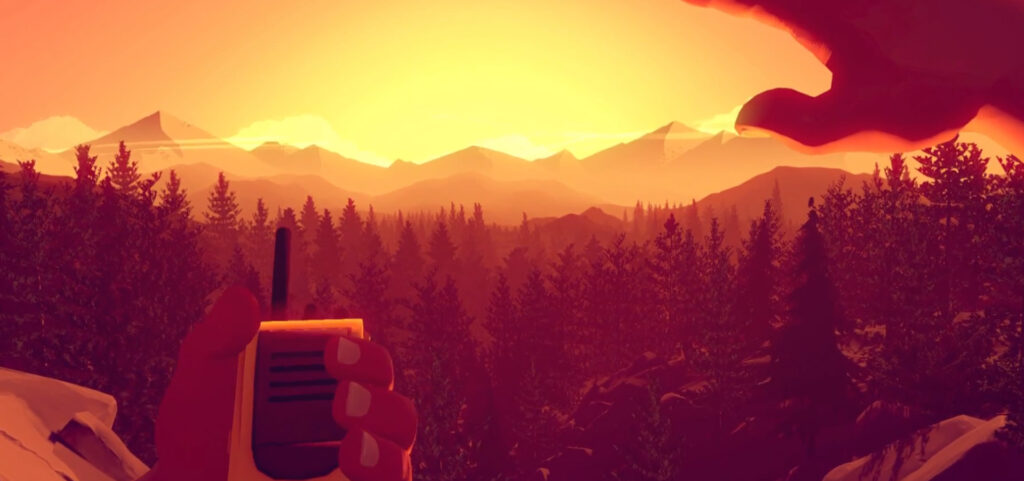
Firewatch tells a story of broken and hurting people. You are thrown into the opening screens of the game, and you play as a man named Henry. In the first few minutes, you will learn a great deal about Henry’s life by clicking through screens of text. He falls in love. They have a life. In three minutes, you learn about it. You participate in it through small text-based options. You try to take care of your wife, but she’s gotten sicker and sicker over the years. You can’t do it on your own any longer. She’s taken away, back to Australia to live with her family, who blame you for letting things get to this state.
You don’t know what to do with yourself, so you accept a job as a Firewatch in the Wyoming wilderness. After a two-day hike, you finally reach the tower that will be your home for the next three months. And then the radio crackles to life.
“Hey, are you there? Pick up”
The controls in Firewatch couldn’t be simpler. This is a few small steps beyond the point and click adventures of old. So, you walk over to the desk, and you pick up the handheld walky-talky.
This is Delilah, and your only real point of human contact throughout the entire game. She is your supervisor: her tower sits at the highest point around, and she supervises a few different firewatches from her lofty point. With binoculars, she can even see you at times. Your radio crackles to life for a hundred different reasons: to report something untoward in the forest, to make idle conversation on the long summer days, to laugh and tease someone, to get out of your own head, even. At times, she’s a helpful voice as you learn the ropes of your job and make your way around your tower and the forest.
When I started playing this game, I felt like doing what Henry did: running from a life of pressures that seemed too overwhelming to face. I slipped into the beautiful Wyoming landscape with a deep sense of relief, able to shut out my thoughts for a few hours.
The forest, alive around you

There’s no other way to say it but that this is an exploration game to the fullest. The Wyoming landscape is beautiful, orange and red and gold intermingling together. It’s practically a character of its own in this game. Rich, lush landscapes of trees, with rough trails cut out between them, open out onto massive vistas at various points in your exploring. Major landmarks, like a tree or a lake, become your way-points as you navigate the park via map. The familiar outhouse at the base of the hill signals that you’re almost home, back to your tower.
I kept expecting the worst: a bear that would jump out and fight me, with a new control mechanism that I’d suck at, or that there would be a surprise attack from an unknown assailant. But, despite the looming sense of horror that lurks behind the beautiful scenery, these woods are mostly safe for you. There’s mystery to be unraveled, but you’re not in a horror game full of jump scares. When the game does throw a curveball, as it did a few times, I wanted to stand up and applaud.
After my first sitting, I was riveted into this beautiful world. I wanted to keep pushing forward, to explore the limits of what was around me, and to figure out the mystery going on. edit
Your very first day on the job, someone starts setting off fireworks down by the lake. It’s your job to go run them off, tell them to stop. From there, some odd events start happening, and you dutifully report them to Delilah. There is enough story in the first day or two of the job that I wanted to keep pushing forward. I was riveted by this beautiful world, and by what seemed to be wrong with it. I wanted to explore the limits of what was around me.
Before long, the mystery in the forest is demanding both your and Delilah’s full attention. You both become determined to do whatever it takes to uncover the truth. Rules get bent, as they must, to figure out what’s happening here. You’re working together against the powers of mysterious and untamed mountain ridges.
Delilah: A face for radio
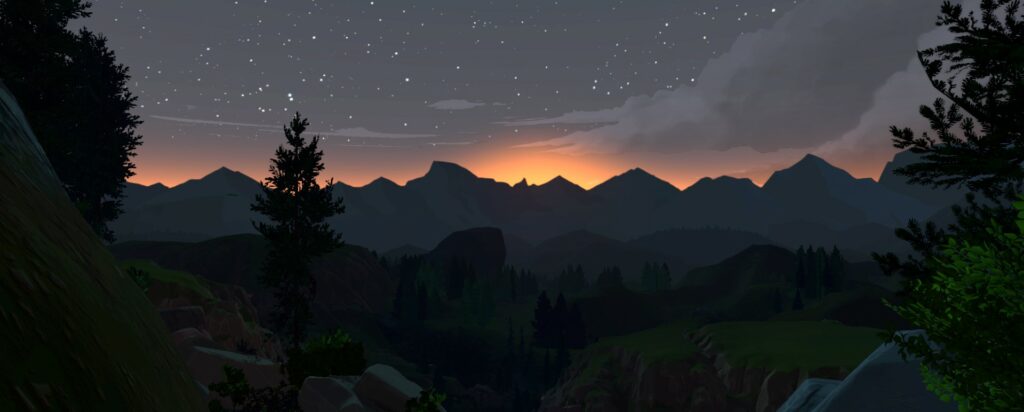
The answer to the riddles of the game rest in the person of Delilah. I won’t say more than that: if you ever have a chance to play the game yourself, you will want to experience the story first-hand. But there is more to this enigmatic character than meets the eye.
This relationship is built over drips and drabs accumulated over months, and the game does a phenomenal job of involving you, as the player, in this. Almost anything can be reported back to Delilah, big or small. There’s a storm rolling in, the sun is going down, and you’ve got to make your way through a canyon and a cave in order to get back to camp. You find yourself talking to Delilah along the way, even as the thunder rumbles and the pensive music sends chills up and down your spine.
Sooner or later, Delilah figures out why you’re here. It doesn’t matter how you play it. At first, I played things close to my vest. After all, who is this person? Who is she to me? Why does she want to know so much about Julia?
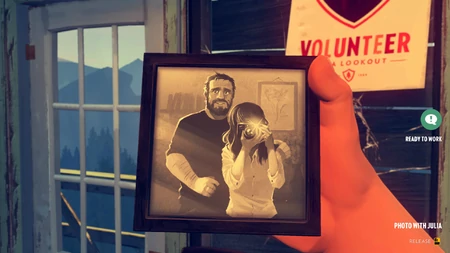
At one point, I realized after Delilah mentioned Julia in passing that I myself hadn’t thought about her for weeks of game time. The text-based exposition at the beginning of the game is an incredible shorthand. Because it’s so light on details and visuals, you easily forget — as Henry forgets — that he has an entire life he’s run away from. Julia is presented to you as a black screen with text details.
You have a photo with her, a journal that you examine on your first hike up to the firewatch tower, but these are small trinkets compared to the vast wilderness in which you find yourself. The story tells you that you love her, and it tells you that you have a life together. The Wyoming wilderness, by contrast, you get to experience first-hand, hours at a time, in full color right before your eyes. With such competition, it’s difficult for Julia not to seem distant.
“She’s sick, and I shouldn’t be here but I am.”
“You came out to put your memories behind you and they’re still right there in front of you.”
Tricky things, emotions
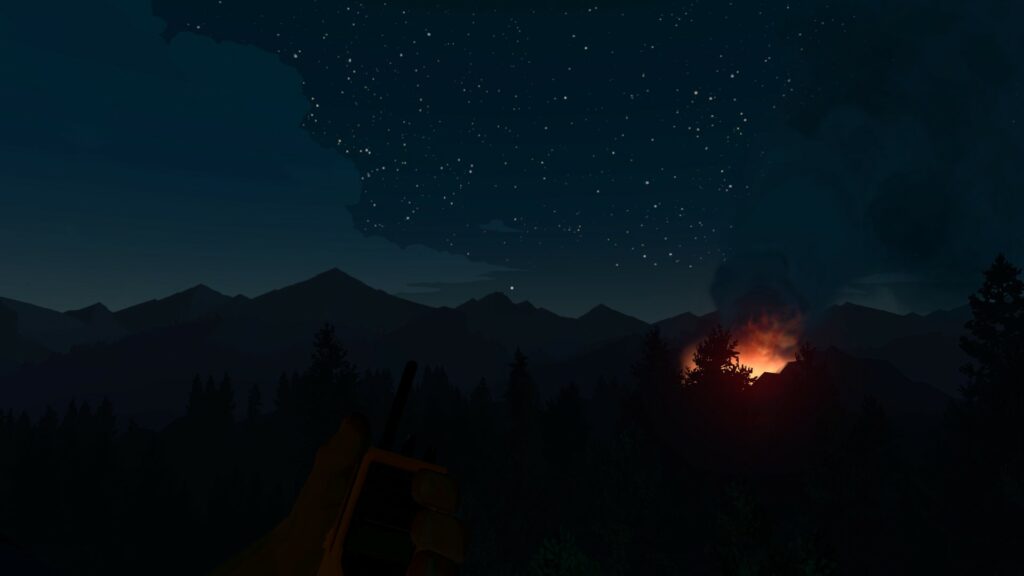
It’s about halfway through the game. It was late, you’d been drinking, she’d been drinking, the radio crackling to life every few minutes. There’s a full moon, and the Flapjack fire, a new blaze that you’re tracking, glows in the distance. Delilah has been more open with you than any other point so far.
You wake up the next morning, and your wedding ring is on the desk next to the bed. For some reason, the game asks you, “Do you want to put your ring on?”
You don’t even remember taking it off.
The game reminds me, all of a sudden, that I’ve been playing a character. No one is around. Nobody will see if you wear the ring or not. Delilah won’t even see, as she’s just on the radio. But the ring is off. How it got that way, you can’t explain, as the game reveals this after a short cut-scene. But the fact that it is off, and that you have to decide to put it back on again. . .
. . . I’ll admit, I probably froze for longer than I even know. All the emotions from outside, from real life, suddenly came flooding into the game, all wrapped up in that one little symbol. I realized that I, like Henry, was running away from things.
Don’t get me wrong, I’m happily married with no plans of ever changing that. My Henry put the ring back on, as an unspoken promise to Julia, the character we never meet, even over a radio. But, as Delilah wistfully tells you one night,
“I wish you were here. We could, you know. . .”
Fin
Please skip this section if you still plan to play the game and haven’t.
Firewatch is a game about broken people leading broken lives. The mysteries are resolved by tracing their paths through the lives of many broken people, Delilah included. Wounds fester in the wilderness, and you realize that Delilah is many years ahead of you on the same trail. She’s buried her pain in alcohol and isolation. She’s been out here ten years, and you’re only three months into this. You see what your life will be like if you stay.
By the end, neither of you are given that chance. The Flapjack fire continues to blaze, bigger and brighter. The Forest Service makes the decision to evacuate all of the towers. Delilah’s tower is the meeting point where the chopper will touch down.
You step out of your tower, and you all but feel the heat of the flames on your face. The fire is close, and the air is bright orange. Shards of ash and bark whip through the air all around you, and the soundtrack is barely audible over rushing wind.
You’ve come to know this square of land pretty well in the last three months, but it’s all almost unrecognizable now, in flames. Your task is to hike the eight miles to Delilah’s tower. You sprint along familiar paths, now wreathed in smoke.
“Wait for me — please.”
“I’ll wait as long as I can, Henry.”
The desperation of this final hike is palpable. Not only has your temporary home been plunged into an inferno, but you’ve lost your connection to Delilah. But after this final exchange, your radio is dead.
You click the button a hundred times, but no one comes on the other end. There’s no witty remark to make about the situation, no earnest instruction to keep you on the right track, nothing. You can’t even talk — without the radio, the game provides no mechanic for you to speak. You’re alone with your thoughts in a forest fire.
You make it to the tower where Delilah is — was, and nobody is there. She got out on an earlier flight. Just as throughout the entire game, Delilah is a phantom: unwilling to present herself to full view. You pick up artifacts from the tower, drawings she made of you while she kept watch over you throughout the summer. If you had only hiked faster! Taken a better path north, perhaps. You wonder if. . .
And the helicopter arrives. An arm reaches out, to pull you to safety.
Conclusions
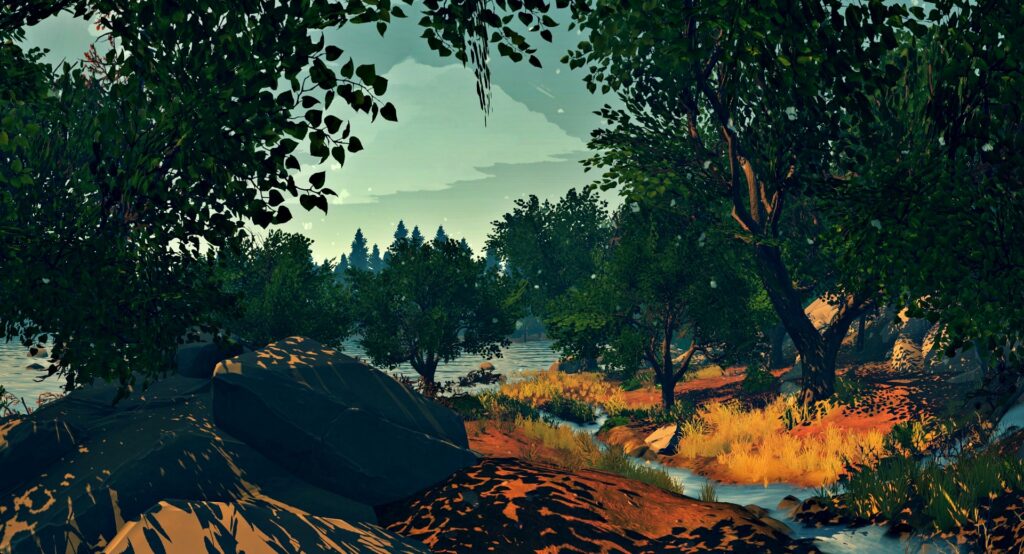
Even now, months later, I feel unable to fully synthesize how this game touched me on eery and personal levels. While that may not be everyone’s experience, I was floored by how much emotion I felt over a game that I played for only six hours. It felt as if I’d participated in a movie — or borrowed someone else’s lifetime — more than I’d played a video game.
Some people have expressed disappointment that the main plot points of the story resolved the way they did. I think that’s intentional on the part of the developers. I too spent most of the game play suspecting a complicated conspiracy theory with huge implications for the forest, the job, and you.
But, at the end, all I was left with was flawed people making flawed choices — including myself! Even with the rails the game provides, there is room to improvise, and make it your own. I could see a Firewatch where Henry never opens up to Delilah (and maybe never learns from her). I could see a Firewatch where Henry, thrown into despair, actually refuses rescue and runs back into the flames (It appears that this incredibly dark ending is possible to play). I could see a hundred Firewatches, all slightly different, but all crystallizing in the two characters of Henry and Delilah.
From a technical perspective, Rich Sommers and Crissy Jones do a phenomenal job voicing Henry and Delilah. There are hundreds, if not thousands, of dialogue snippets in the game, and they provide the game with a worn, lived-in feel that’s like a comfortable pair of jeans.
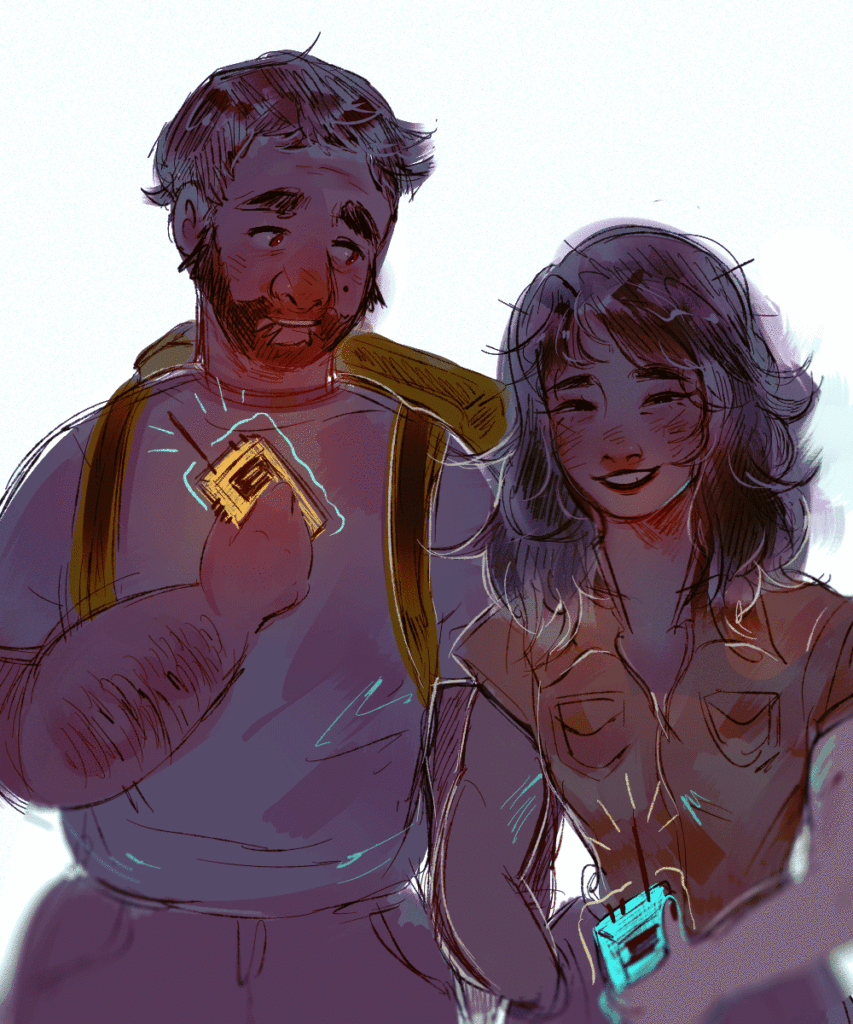
You, as a player, desperately want to meet Delilah, and I think that’s a testament to how much the voice actor was able to do with the brief, “so, you’re a voice on a radio the whole time.” I’m not the only one who feels this way — just go check the fan art!
We crave a resolution to this story. We want to know that Henry is going to be all right — more importantly, we want to know that Delilah is going to be all right! While we are in the forest fire, safety is Delilah. But when Henry is rescued — alone — the screen fades to black, and the character must go to put together his own life.
As for Delilah, her path is even more uncertain. Will she move on from the pain that sent her to the wilderness in the first place? Will she move on from the pain the wilderness inflicted on her once she was there?
We players long for these characters to heal, and that’s significant: it points to our fundamentally comic human impulses. We are made to feel that the world is not right, and that it should be made right. Firewatch speaks to that.
It’s powerful precisely because it doesn’t end on a tidy note of resolution. The fire swept it all away, and even still, Henry and Delilah were left with their own lives and their own problems to sort out. I still hope they get to meet. I hope they get their problems sorted out and their lives healed at some point. It would be inhuman to hope for anything else.
As for me? I watched the entire credits screen scroll, as if I were personally thanking every person who helped to build this game. I took in every drop of the beautiful landscape and every second of the soulful music. After the screen faded to black and I was dumped back onto the main menu, I took a deep, ragged breath, and closed the lid of my computer.
(Postscript)
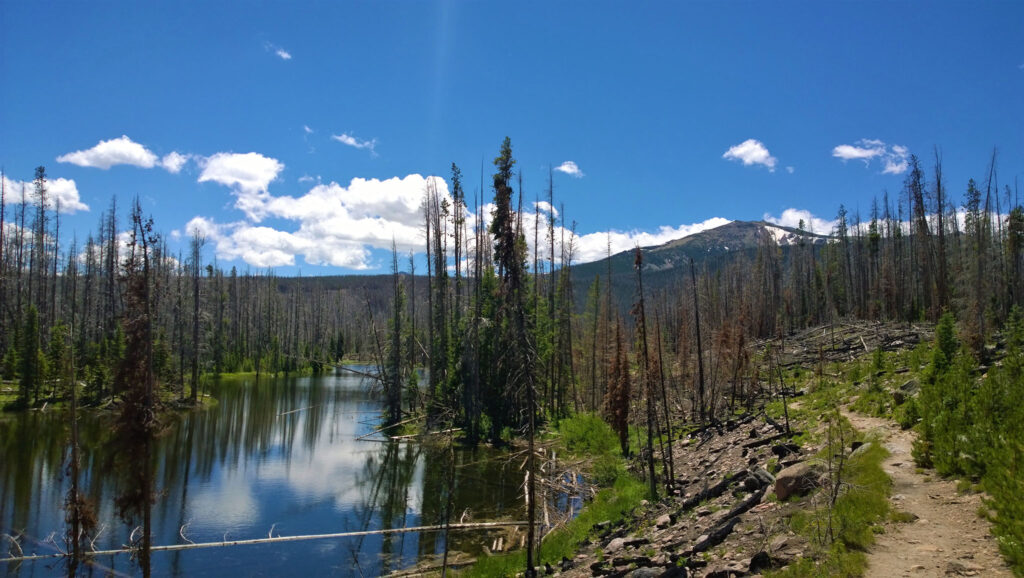
We’re headed back to the very same campsite at Big Creek Lakes, this June. We’ll take a week away, breathe in the crisp air of the Rockies, and then we’ll dive back into the wear of every-day living. The time to heal is important. Sometimes, you even have to run away to find it.
“I came out here for a breath of fresh air and some adventure.”